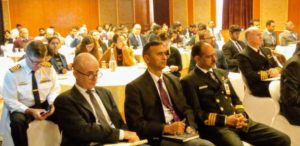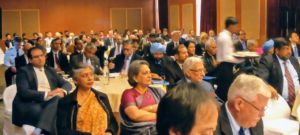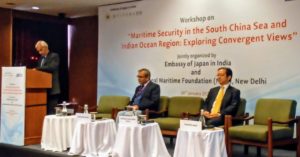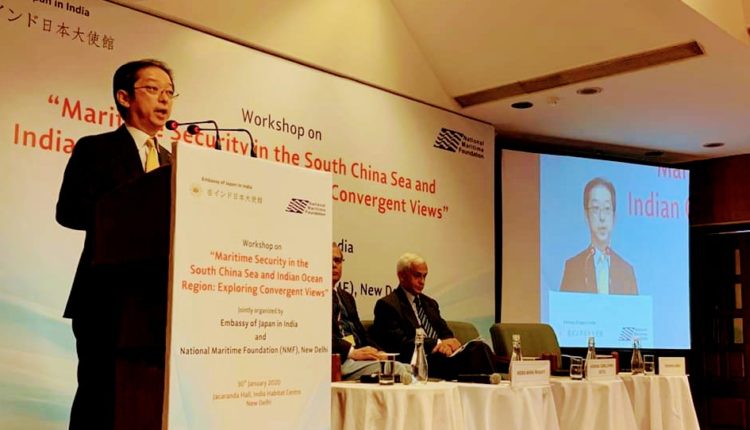India, Japan working together to ensure peace, maritime security in South China Sea, Indian Ocean: Toshihide Ando
NEW DELHI: In order to realize the Free and Open Indo-Pacific (FOIP) concept in the context of maritime security in the South China Sea and the Indian Ocean, upholding the rule of law in the maritime domain and enhancing maritime security cooperation amongst various nations in the region including India and Japan, are two much-needed measures.
Toshihide Ando, Chargé d’Affaires a.i., Embassy of Japan in India said this in his address during a Workshop titled “Maritime Security in the South China Sea and the Indian Ocean: Exploring Convergent Views” held in New Delhi on January 30.
“As we face challenges as well as opportunities in the maritime domain in this region, maintaining a rule-based maritime order is increasingly an important element to realize a free and open Indo-Pacific,” said Ando while delivering his opening remarks.
 The workshop was jointly organized by the Embassy of Japan, New Delhi and the National Maritime Foundation to deliberate varied facets of Maritime Security in the South China Sea and Indian Ocean Region, and featured a number of globally renowned speakers from varied professional backgrounds.
The workshop was jointly organized by the Embassy of Japan, New Delhi and the National Maritime Foundation to deliberate varied facets of Maritime Security in the South China Sea and Indian Ocean Region, and featured a number of globally renowned speakers from varied professional backgrounds.
While asserting that Japan considered India as an indispensable strategic partner to work hand-in-hand to realize a FOIP, Toshihide Ando said, “When we talk about the peace and prosperity of the Indo-Pacific, which encompasses vast waters spanning from the Pacific to the Indian Ocean, the established norms such as freedom of navigation and overflight, must be upheld. Disputes have to be resolved peacefully in accordance with international law, as reflected in UNCLOS.”
Ando recalled, Prime Minister Abe, in his address at the Shangri-La Dialogue in 2014, laid out three principles of the rules of law at sea: first, states shall make and clarify their claims based on international law, second, states shall not use force or coercion in trying to drive their claims, and third, states shall seek to settle disputes by peaceful means.
“However, if we turn our eyes to the South China Sea, attempts to unilaterally alter the status quo continue, and militarization of disputed features has not ceased. Japan remains seriously concerned about the situation on the ground as other partners do,” lamented Chargé d’Affaires a.i.
As regards the Maritime Security Cooperation, Japan has suggested a free and open maritime order requiring security cooperation at sea.
“We saw that last year was full of examples which showcase progress in this area between Japan and India. This includes the bilateral exercises between each of the three components of Japan’s Self Defense Forces and the Indian military forces, in addition to the regular Japan-India-US trilateral naval exercise of MALABAR.”
The Japan Maritime Self-Defense Force and the Indian Navy also agreed to deepen their cooperation in the field of Maritime Domain Awareness, and they have already started the exchange of information in this field. The launch of the Indian Navy’s Information Fusion Centre will greatly contribute to the bilateral cooperation to this end.
 Also Japan and India, together with the United States and the Philippines, conducted their first joint naval exercise in the South China Sea in May last year only.
Also Japan and India, together with the United States and the Philippines, conducted their first joint naval exercise in the South China Sea in May last year only.
The Coast Guards of the two countries are working in close collaboration, too. They have been conducting annual joint exercises for almost two decades, and this year’s exercise just took place off the coast of Chennai earlier this month.
From the diplomatic viewpoint, Japan and India have held regular maritime affairs dialogue, and at the fifth round of dialogue held in December in Tokyo, both sides discussed bilateral cooperation on maritime domain awareness, humanitarian assistance and disaster relief, counter-piracy, in addition to joint exercises and mutual port visits.
“In addition to our bilateral cooperation, we have promoted collaboration with other like-minded partners who share the vision of a free and open Indo-Pacific. The Indo-Pacific region is so vast and its challenges are so complex that no single country can address them alone. Japan, India, and the United States have elevated the level of their trilateral dialogue to the summit level,” said Toshihide Ando.
The most significant concrete cooperation of the three countries is MALABAR naval exercise. Japan, India, the US, and Australia held the first Quad ministerial meeting last September, and have been eagerly discussing the ways to ensure maritime security in this format. Maritime capacity-building of countries in the region is also crucial to enhance maritime security.
Ando reiterated the United States began to articulate its Indo-Pacific Strategy in 2017, Australia developed its Indo-Pacific concept and ASEAN also released the ‘ASEAN Outlook on the Indo-Pacific’ last year, we are particularly happy to see that India unfolded its Indo-Pacific vision when Prime Minister Modi addressed the Shangri La Dialogue in 2018.
While emphasizing that Japan considers India as an indispensable strategic partner, Toshihide Ando said, “We find a lot of commonalities with India’s vision on the Indo-Pacific, including inclusiveness, ASEAN centrality, rule of law, and connectivity. In the ‘Japan-India Vision Statement’ issued during Prime Minister Modi’s visit to Japan in 2018, Japan and India affirmed their determination to work together for the shared goal of a free and open Indo-Pacific.”
 Admiral Sunil Lamba, PVSM, AVSM, Indian Navy (Retd), Chairman, National Maritime Foundation (NMF), Former Chief of the Naval Staff, Indian Navy said Maritime Security Cooperation between India and Japan through enhanced exchanges was expanding in the maritime domain awareness and mutual logistics support in the Indo-pacific region, and it will contribute to regional peace and stability.
Admiral Sunil Lamba, PVSM, AVSM, Indian Navy (Retd), Chairman, National Maritime Foundation (NMF), Former Chief of the Naval Staff, Indian Navy said Maritime Security Cooperation between India and Japan through enhanced exchanges was expanding in the maritime domain awareness and mutual logistics support in the Indo-pacific region, and it will contribute to regional peace and stability.
“India and Japan have made significant progress in fostering joint efforts towards shared security since their announcement of the indo-japan Joint Declaration of Security Cooperation in 2008, and Memorandum of Defence Cooperation and Exchanges conducted in 2014, said Admiral Lamba”
The first India Japan 2+2 foreign and defense ministerial meeting was held in November last year in News Delhi, and this dialogue has furthered strengthened and enhanced the strategic depth of security and defense cooperation between the two countries, he said adding that it reiterated the commitment based on the 2008 joint declaration of security cooperation and 2009 action plan towards security cooperation.
He observed that both the countries have made fruitful engagements to establish mechanisms including the annual defense ministerial dialogue, defense policy dialogue, national security advisors dialogue and dialogue between each of the services and bilateral dialogue between coast guards as well as exercises between each of the three services and exercises between the two coast guards.
“Considerable importance has been accorded to MALABAR joint exercise. First counter-terrorism exercise and between Japanese ground defense force and Indian army as well as the Japan Air Defence participation as observers. In fact, the exchanges between Indian Navies and Maritime Defence Force of Japan have been increasing and galloping as time is going by,” he added.
The day-long workshop was witnessed three Panel-Discussions to dilate upon the many contours of maritime security in the vast geographical expanse of South and Southeast Asia, and also to address the South China Sea.
Other significant speakers and panelists included Vijay Thakur Singh Secretary (East) Ministry of External Affairs (MEA), Government of India (TBC), Vice Admiral Pradeep Chauhan, AVSM & Bar, VSM, IN (Retd) Director-General, National Maritime Foundation (NMF), Admiral Jayanath Colombage, the Chairman, Pathfinder Foundation Former Chief of Naval Staff, Sri Lanka Navy Panellist, Dr. Tetsuo Kotani (Ph.D.), Senior Research Fellow Japan Institute for International Affairs (JIIA), Captain Sarabjeet Singh Parmar, Indian Navy (IN) Executive Director, National Maritime Foundation Panellist and Dr. Constantino Xavier, Fellow, Foreign Policy & Security Studies, Brookings India.
Hemant Krishan Singh, Former Ambassador of the Republic of India to Japan, Indonesia, Timor-Leste Director-General, Delhi Policy Group (DPG), Prof Carlyle Thayer, Emeritus Professor, School of Humanities and Social Sciences, University of New South Wales (UNSW), Canberra, Australia Director, Thayer Consultancy, Yu Harada, Research Fellow, the National Institute for Defense Studies (NIDS), Jay Maniyar, Research Associate (National Maritime Foundation), Dr. Nehginpao Kipgen, Associate Professor, Assistant Dean (International Collaboration) and Executive Director of Centre for Southeast Asian Studies, OP Jindal School of International Affairs, and Ambassador Sujan R Chinoy Director-General, Institute for Defense Studies & Analyses (IDSA) also graced the occasion with their presence.



